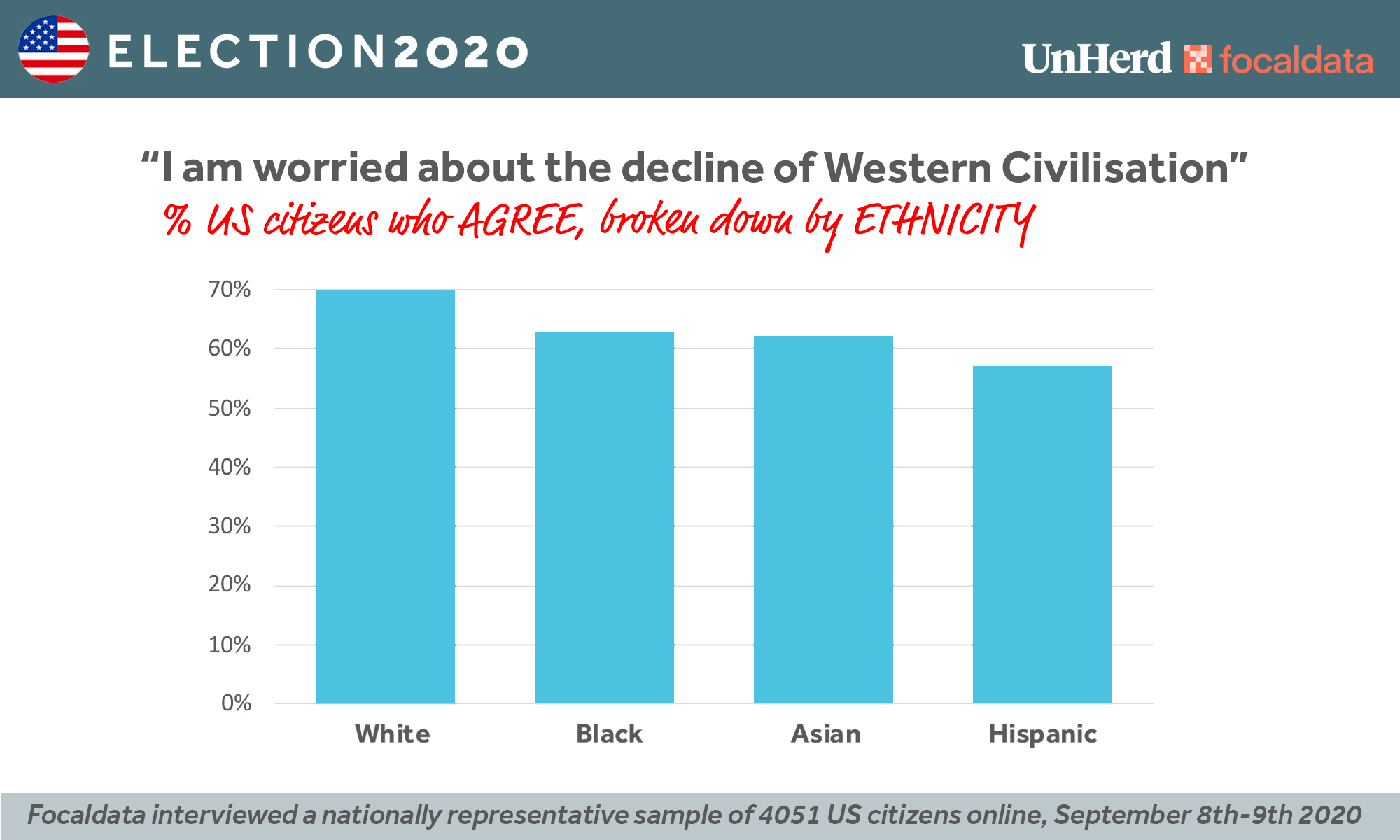It’s fair to say that a certain civilisational consciousness is in the air at the moment. As I’ve argued in UnHerd recently, the rising powers of Eurasia are increasingly using a rhetoric of following their own unique, civilisational special paths to justify their increasingly open divergence from liberal norms.
Similarly, there seems to be a growing fashion in publishing, always a bellwether for the concerns of the moment, for books on civilisational collapse, whether the collapse in question is those of societies past, like the enjoyable new book on Alaric the Goth, or of our own, like the newly-translated How Everything Can Collapse. One way or another, a certain Spenglerian gloom is wafting through the cultural ether.
It’s extremely interesting then, that in our exclusive UnHerd/FocalData poll of American voters, 68% claim to be worried, to some degree, about the decline of Western civilisation.
This doom-laden sentiment doesn’t seem to be strongly associated with any particular level of educational attainment, being shared more or less equally across all levels of education. If anything, the most striking result is that it is those with a less than 9th grade degree of education who disagree most strongly, with 19% firmly rejecting the idea.
Similarly, with those strongly agreeing clustering around the 30% mark across all levels of household income, concerns over the survival of Western civilisation don’t seem to be firmly associated with a particular social class either.
Broken down by the racial categories of the US Census, we see that 31% of whites strongly agree compared to only 20% of Hispanics, but even here the gulf isn’t as great as it first may seem; when we add in those who mildly agree, the gulf is only between 71% of whites broadly in agreement, against 65% of Hispanics. Similarly, 62% of Asians and 63% are worried about the decline of Western civilisation to some degree.

So what’s going on? You would, no doubt, expect these sentiments to be strongest among Trump voters (and indeed, 40% of 2016 Trump voters strongly agree, compared to 28% of Clinton voters), but their currency across all racial and class divisions and all degrees of educational attainment indicate something much bigger is going on.
This doesn’t seem to some kind of racial or cultural dog whistle, as you might at first expect, nor, given its spread across education levels, does it seem to be some kind of snobbish protest over declining cultural or educational standards.
If anything, there’s a degree of hope here. Given the months of increasingly violent protests over statues and over America’s European heritage in general, you’d expect a topic as potentially combustible as “Western Civilisation” to be a much more contentious issue, yet Americans are broadly in agreement, going against all potential fault-lines, on worrying over its survival.
Perhaps Western Civilisation is such a broad and nebulous concept that it can unite conservatives, worried about immigration, or statue-toppling, or the 1619 Project, with liberals (in the American sense), worried about democratic norms; that Western Civilisation can be seen by American conservatives as something threatened by China’s rise, and by liberals as threatened by Russian election meddling.
In an election period marred by violence and increasingly escalatory rhetoric by both sides, in a country increasingly torn apart by issues of race and culture, you wouldn’t expect so many American voters to be united, rather than divided, by worries about this particular question. Like the barbarians in Cavafy’s famous poem, whose threatened arrival brought the squabbling citizens of his unnamed Roman city together to wait for their own conquest, perhaps the fear of its loss is some kind of solution.
For full tables and methodology click HERE.











Join the discussion
Join like minded readers that support our journalism by becoming a paid subscriber
To join the discussion in the comments, become a paid subscriber.
Join like minded readers that support our journalism, read unlimited articles and enjoy other subscriber-only benefits.
Subscribe